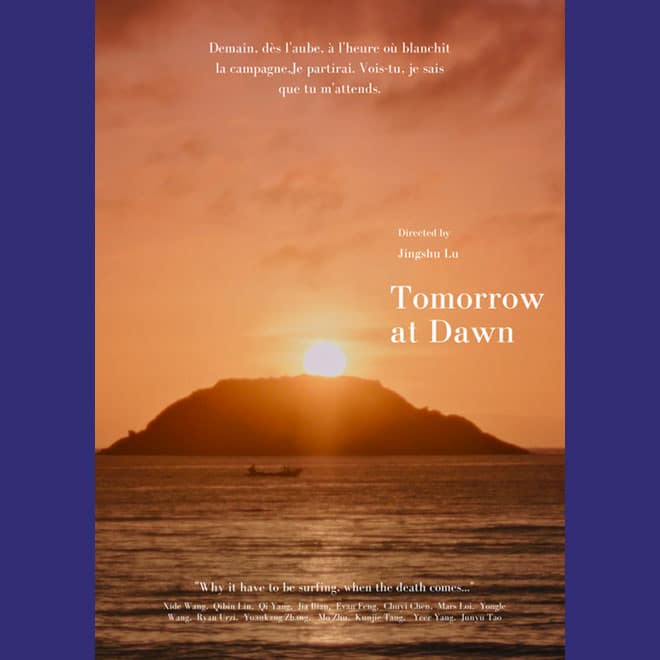Synopsis
A girl with pancreatic cancer wants to surf with her dad one last time before she dies. The moment the girl stepped on the surfboard, she was intoxicated by the buoyancy it held her up to. Floating brought her unparalleled peace in life. Peace is a more vast force. The state of insensibility is beyond life and death. Just like the ocean behind it, it also has some kind of natural and mysterious power, and it is the place where life on earth is born and destroyed. When people see the sea, they will have two feelings, one is that the sea is unpredictable, boundless, and even a little scary; the other is to feel the majesty and majesty of the sea, and the infinite energy it contains. These two feelings are like the two phases of Avalokitesvara, compassion and wrathful Vajra, all in the mind of the viewer. These two characters of the sea first dispel people’s self-consciousness, which can form a strong reversal and constitute drama. The director intends to use this to construct the conflicts and opposites in this story: the terminally ill and the surfing sport full of vitality, the father who does not want to give up and the daughter who returns to peace.
Details
- DIRECTOR /Jingshu Lu
- COUNTRY /China
- CATEGORIES /Short film
- RUNTIME /15:00

Directors Biography
Jingshu Lu
In 2020, my father, who had been divorced for many years and lived in other places, returned to Shenzhen from Dalian to live permanently. It was also at this time that the Covid-19 just came. After school started, I didn’t go back to school and I asked my father to go to the beach every weekend. We have changed from seeing only two or three times a year to once a week for a small trip, and our relationship has become closer. The feelings that used to be as light as ordinary friends have become complicated and deeper. I realized the responsibility and fetters of my father, and there is a subtle difference between getting along with friends. One weekend I went diving on a whim. This was the first time I went into the sea after seven or eight years. Over the years, I have always been fear of drowning because my father pushed me too excitedly into the deep waves when I was a child. Swimming in the sea is psychological trauma. So going into the sea this time was a kind of impulse for me. Why did I suddenly want to go into the sea? I pointed this vague answer to the sense of security that my father and I have deepened our bond. During the diving process, I was first afraid and difficult to adapt, and then excitedly explored the beautiful scenery in front of me, and experienced the feeling of fear and excitement intertwined. After going ashore, I hadn’t taken off my surfing suit and was still reluctant to part with it. The boss lent me a surfboard. As a lazy person, I just lay on it and let the waves push me to float, from the sea to the shore, over and over again. Indulging in the buoyancy it holds me up, I feel that that kind of floating brings me an unparalleled peace in my life. Peace is a more vast force, and the state of insensibility is beyond life and death. Just like the ocean behind it, it also has some kind of natural and mysterious power, and it is the place where life on earth is born and destroyed. When people see the sea, they will have two feelings, one is that the sea is unpredictable, boundless, and even a little scary; the other is to feel the majesty and majesty of the sea, and the infinite energy it contains. These two feelings are like the two phases of Avalokitesvara, compassion and wrathful Vajra, all in the mind of the viewer. These two characters of the sea first dispel people’s self-consciousness, which can form a strong reversal and constitute drama. This made me think about how to construct the conflicting opposites of this story: the terminally ill and the surfing full of vitality, the father who refused to give up and the daughter who returned to peace.
The film is based on the aesthetic awareness of wabi-sabi, which generally refers to things that are simple and quiet. It comes from the general three dharma seals of Hinayana Buddhism (all actions are impermanent, all dharmas have no self, and Nirvana is peaceful), especially impermanence. Wabi is the integration of simple beauty in simplicity and tranquility, and sabi is the luster of time. The film runs through the concept of continuation of time, impermanent fate and calm and light choice, remembrance and letting go.
The keynote of the video can refer to that summer, the tranquil sea. Contrary to explicit, direct, and sharp emotional expressions, it is graceful, serene, and soft. Such as “the place where the clouds are full of spring flowers”. There is silence accompanied by faint shadows, as Ya Changming said, “In the autumn sky and evening, there is no news.” Especially early morning scenes.
Cast
“The father” : Junyu Tao
“The daughter” : Yeer Yang
Credits
Directed by : Jingshu Lu
Producer : Qi Yang
Director of Photography : Evan Feng

